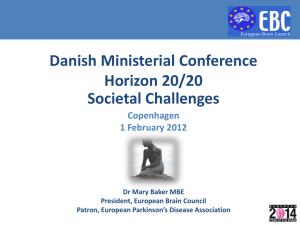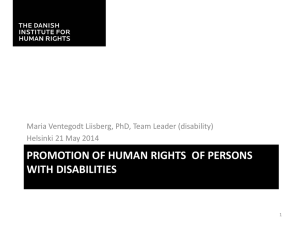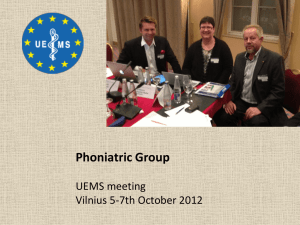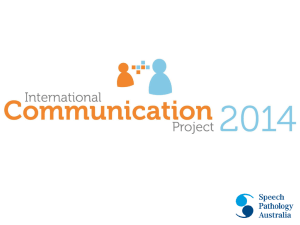Prof. Harry Minas
advertisement
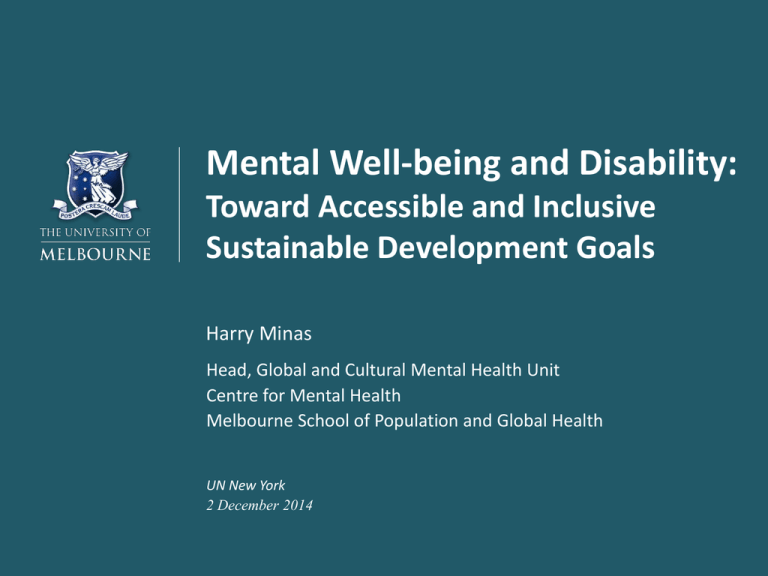
Mental Well-being and Disability: Toward Accessible and Inclusive Sustainable Development Goals Harry Minas Head, Global and Cultural Mental Health Unit Centre for Mental Health Melbourne School of Population and Global Health UN New York 2 December 2014 Mental Disorders Disability Why invest in mental health & disability? The World Economic Forum estimates that chronic disease will cost the global economy more than US$47 trillion between 2010 and 2030. One third (US$16 trillion) is attributed to mental disorders. Most of this cost is due to persistent disability – direct treatment and social care and lost productivity Reducing premature mortality and disability from mental disorders by one third would save approximately US$5 trillion over 20 years. Mental Disorders NonCommunicable Disorders Disability Poverty Mental Disorders WHO Mental Health Action Plan Disability CRPD and WHO Disability Action Plan WHO NCDs Action Plan UN SDGs Poverty NonCommunicable Disorders Mental Disorders WHO Mental Health Action Plan Disability CRPD and WHO Disability Action Plan Governance Investment Leadership Evidence Mental Health Target UN SDGs Poverty WHO NCDs Action Plan NonCommunicable Disorders APEC Health Asia Pacific 2020 strategy “Recognizing that health is central to development; that it is a prerequisite for, an outcome of, and effective indicator of sustainable development; that health and health equity are integral to public policies of all sectors; that the value of health capital in an economy dwarfs any other form of capital…” APEC Roadmap to Promote Mental Wellness in a Healthy Asia Pacific (2014-2020) Mental Health System Development in Vietnam Initiatives in: - Governance - Investment - Leadership - Evidence Disability Mental Disorders WHO Mental Health Action Plan CRPD and WHO Disability Action Plan Convention on the Rights of Persons with Disabilities (CRPD) ratified by the National Assembly 28 November 2014 Governance Investment Leadership Evidence Mental Health Target UN SDGs Poverty National Mental Health Strategy 2015-2020 (vision to 2030) National Strategy for Prevention and Control of NCDs 2014-2020 WHO NCDs Action Plan NonCommunicable Disorders • Health Information System Development Strategic Plan 2014 • National survey of mental health and social care facilities/services • Annual burden of disease estimates The Asia Pacific Region is ready to act on a clear SDG mental health target… (as several regions are) Regional organisations Asia Pacific Economic Cooperation Forum Association of South-East Asian Nations National governments Sub-national governments A clear mental health target will focus, expand and accelerate such action Open Working Group Goal 3: Ensure healthy lives and promote well-being for all at all ages Target 3.4 By 2030 reduce by one-third premature mortality from noncommunicable diseases (NCDs) through prevention and treatment, and promote mental health and wellbeing. Suggested revision of Target 3.4 By 2030 reduce by one-third premature mortality and disability from non-communicable diseases (including mental disorders), through promotion, prevention, treatment, rehabilitation and social care, and protection of human rights. www.FundaMentalSDG.org Target ‘The provision of mental and physical health and social care services for people with mental disorders, in parity with resources for services addressing physical health.’ Indicators 1) To ensure that service coverage for people with severe mental disorders in each country will have increased to at least 20% by 2020 (including a community orientated package of interventions for people with psychosis; bipolar affective disorder; or moderate-severe depression). 2) To increase the amount invested in mental health to at least 5% of the total health budget by 2020, and to at least 10% by 2030 in each low and middle income country. The proposed FundaMentalSDG target has been adopted by the UK All-Party Parliamentary Group on Mental Health as Recommendation 4 in its report (November 2014) Lesson from the MDGs More coherent, collaborative and focused action by: Increased political attention and commitment Governments Clear focus on measuring and achieving the target Service providers Persons with mental disorder Increased investment – from all sources Mental Health SDG Target and Indicators Civil society organisations Educators More coherent program of work Focus for collaborative action across sectors, stakeholders Researchers Multi- and Bilateral Donors / Aid Agencies Major Philanthropic Agencies Two Possible Mental Health Targets Revised 3.4 FundaMentalSDG By 2030 reduce by onethird premature mortality and disability from noncommunicable diseases (including mental disorders) through promotion, prevention, treatment, rehabilitation and social care, and protection of human rights. Provide mental and physical health and social care services for people with mental disorders, in parity with resources for services addressing physical health. Thank you for your attention Harry Minas h.minas@unimelb.edu.au

